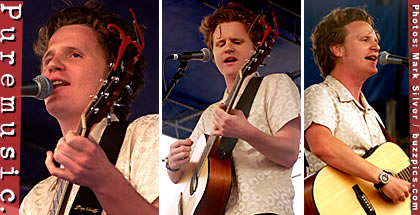
A Conversation with David Mead (continued)
PM: So you're not even trying to get that third RCA record back at this point?
DM: Well, I did actually end up getting it back, so I have it. Now I'm not exactly sure what to do with it. It would be kind of a big leap [laughs] from this one, stylistically, because it sort of went in a different direction.
PM: Wow.
DM: Well, I think Indiana works with the first two in its own way, but the one that didn't come out sort of works with the first two in a completely different way. But to go from this one to that one, that might be too big of a left turn. We'll see. I'm sure it will see the light of day somehow. I mean, I think it's really good. I'm very proud of it, but I guess the time needs to be right for that kind of thing.
PM: Right. How would you characterize the difference between the unreleased record and Indiana, which has an acoustic organic feel--
DM: Yeah.
PM: --for what is still a great pop record.
DM: The other record still has acoustic instruments on it, but it's probably the most rhythm oriented record that I've done, and it's the biggest sounding record. I wouldn't say it's as glossy as the first two. It actually is rougher around the edges. But it just has a lot more colors and elements to it. I don't know, it's not really a rock record, but it's more of a big pop record somehow. And Indiana kind of strikes me as a big pop record in a very small scope. You know what I mean?
PM: Yeah. For all its grandness--and I don't mean grandiosity--but for all its grandness, it has a very intimate feel.
DM: Yes. We kept it pretty small, intentionally, partially in response to having just gone through the process of having done the other record, which felt like a long process. But I guess it was about two months, all said and done.
PM: Right. Well, can we talk a little bit about that period in New York City? I suspect you were living there during the RCA years, right?
DM: Yes, I was.
PM: And so, New York City and the big time, relatively speaking, what was that time all about?
DM: Well, I'd always had kind of a romance going with that city, since I was a kid. And when I started with RCA, I finally had the freedom to just get up there and do it. So, yeah, that was just a really big creative metamorphosis, because for once I didn't have to go to a day job. I mean, my job for a while was really to just walk around and soak it up. And I did. So it was great for that.
PM: And where were you living?
DM: I lived in the East Village.
PM: That's the best.
DM: Yeah. It was. It was definitely a very fun time.
PM: And were you playing gigs, many solo or band gigs or--
DM: Yeah. I played a lot at the Living Room.
PM: What a great room.
DM: The Living Room and Fez and Arlene's Grocery, I think, were probably my three primary gigs.
PM: Three of my favorite New York joints. Were you playing those solo or with guys who might be playing with Richard Julian or Jennifer Jackson or some of our other friends up there?
DM: Both, actually. I played solo and with two guys, one named Ethan Eubanks and one named Whynot Jansveld. And they toured with me throughout the whole cycle of the second record.
PM: Touring around the Northeast?
DM: Yeah.
PM: Cool. And when you decided that you would come back to Nashville, what was that whole process about?
DM: Well, I think I was a little bit burned out on New York. I think I lived there long enough where it actually became fairly normal. And once that happened, I just wasn't sure if it was worth it to me anymore, just the expense of it and the hassle of it. I mean, there are a million great things about it to counter that, but suddenly it was like, "Well, this is where I live, this is my home." And once I had that sensation, it just wasn't as great anymore.
[laughter]
PM: Yeah, once you been there, done that.
DM: Right. So I kind of decided to go back to Nashville temporarily and just recuperate a little bit. And a couple things happened. Well, I met the woman who became my wife, for one thing. [His wife is the artist Natalie Cox Mead.] And it just felt really good down here, and it still does. So I'm happy I did.
PM: Yeah, I like it here.
DM: Me too. continue
print (pdf) listen to clips puremusic home